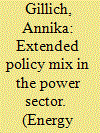|
|
|
Sort Order |
|
|
|
Items / Page
|
|
|
|
|
|
|
| Srl | Item |
| 1 |
ID:
175925


|
|
|
|
|
| Summary/Abstract |
As the impacts from climate change are progressively being felt around the globe, there is an increasing urgency in the need for policymakers to find ways to reduce greenhouse gas emissions. The rental housing sector offers one such clear opportunity to reduce CO2 emissions. However, there has been a lack of consensus regarding the policies that would best deliver a sustainable rental sector. Building on calls in the literature to examine policy mix solutions for this conundrum, a Policy Delphi methodology, using both qualitative and quantitative techniques, identified seven key policy areas. These were divided into carrot policies (tax incentives, rebates and grants); cusp policies, that are neither clearly carrot nor stick, but often have a leaning towards one or other (loans, energy arrangements, improved rental rights); and stick policies (minimum standards, mandatory disclosure). Minimum performance standards, rebates and tax incentives were identified as the most effective policy solutions by the expert panel. Findings suggest that any policy mix should include both carrot and stick policies. When integrated with the existing ‘enabling forces’ literature, a model emerges that highlights the policy pathways to an environmentally sustainable rental housing sector.
|
|
|
|
|
|
|
|
|
|
|
|
|
|
|
|
| 2 |
ID:
177107


|
|
|
|
|
| Summary/Abstract |
With the phase-out of coal power plants, the existing mix of instruments aimed at decarbonising electricity sectors is getting more complex. This paper contributes to its understanding by highlighting the impact of coal phase-out, CO2-price and increasing capacity of variable renewable energies on contribution margins of power plants. By visualizing these three instruments in a brownfield screening curves model (SCM), their fundamental effects on plant operation, electricity price and margins become apparent at a glance. Moreover, the SCM allows to derive generic statements about winners and losers on the supply side. Results are then quantified within a case study for Germany using the power sector model E2M2. The high resolution regarding time and generation system permits a realistic simulation of electricity prices and thus of margins at plant level.
|
|
|
|
|
|
|
|
|
|
|
|
|
|
|
|
| 3 |
ID:
186216


|
|
|
|
|
| Summary/Abstract |
The existing literature on macroeconomic policy research is mainly concerned with the impact of a single monetary or fiscal policy on China's macroeconomic fluctuations in a closed economy. However, the effect of a mix of monetary and fiscal policies has been neglected. This paper addresses this issue with an open economy dynamic stochastic general equilibrium model. It applies impulse-response and welfare analyses to explore the stabilization effect of various mixes of monetary and fiscal policies. The results show that the optimal monetary policy and fiscal policy mix varies in different cases. When government spending shocks happen, the aggressive fiscal policy and passive monetary policy would be the best choice. In contrast, for domestic interest rate shocks, foreign interest rate shocks, and foreign consumption shocks, the passive fiscal policy and aggressive monetary policy are more applicable. This article explains China's economic fluctuations and highlights the importance of mix of monetary and fiscal policies in the face of different shocks.
|
|
|
|
|
|
|
|
|
|
|
|
|
|
|
|
| 4 |
ID:
162286


|
|
|
|
|
| Summary/Abstract |
Governments provide various incentives for the production of electricity from renewable energy sources (RES-E). South Korea has promoted the use of such electricity through various programmes, such as Feed-in Tariff from 2002 to 2011, and Renewable Portfolio Standard (RPS) since 2012. The RPS appears to have been particularly effective in stimulating the use of RES-E. However, there remain several issues regarding the current RPS’ policy design. This study examines South Korea's RPS by focusing on two issues. The first issue is the regulation of technology competition under the RPS; and the second issue is risk mitigation, which is generally known as a weakness of the RPS policy.
|
|
|
|
|
|
|
|
|
|
|
|
|
|
|
|
| 5 |
ID:
117272


|
|
|
|
|
| Publication |
2013.
|
| Summary/Abstract |
In virtually all EU Member States, the EU Emissions Trading Scheme (EU ETS) is complemented by support schemes for electricity generation from renewable energy sources (RES-E). This policy mix has been subject to strong criticism. It is mainly argued that RES-E schemes contribute nothing to emissions reduction and undermine the cost-effectiveness of the EU ETS. Consequently, many scholars suggest the abolition of RES-E schemes. However, this conclusion rests on quite narrow and unrealistic assumptions about the design and performance of markets and policies. This article provides a systematic and comprehensive review and discussion of possible rationales for combining the EU ETS with RES-E support schemes. The first and most important reason may be restrictions to technology development and adoption. These may be attributed to the failure of markets as well as policies, and more generally to the path dependency in socio-technical systems. Under these conditions, RES-E schemes are required to reach sufficient levels of technology development. In addition, it is highlighted that in contrast to the EU ETS RES-E support schemes may provide benefits beyond mitigating climate change.
|
|
|
|
|
|
|
|
|
|
|
|
|
|
|
|
|
|
|
|
|